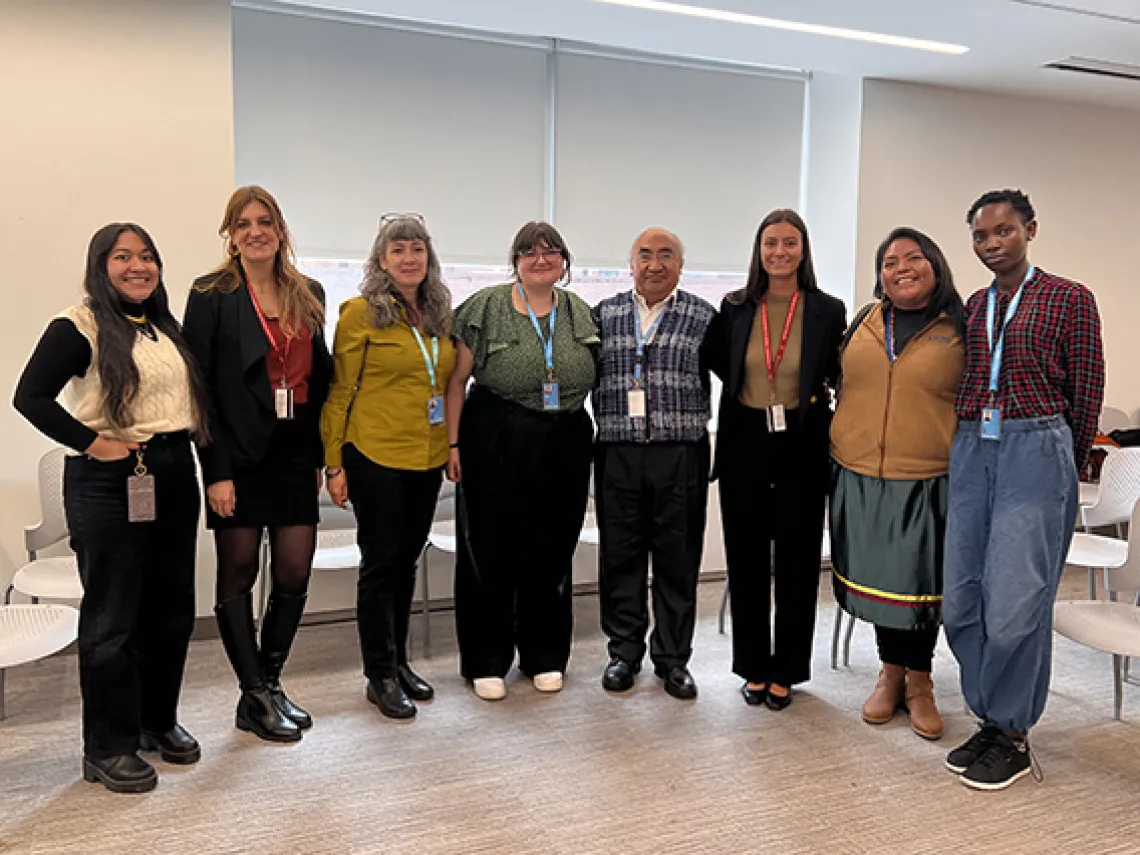IPLP Experts Present at United Nations

The Indigenous Peoples Law and Policy (IPLP) Program sent a delegation of students and faculty to the Twenty-Third Session of the United Nations Permanent Forum on Indigenous Issues (UNPFII).
United Nations Special Rapporteur on the Rights of Indigenous Peoples (UNSRRIP), José Francisco Calí Tzay, hosted by the IPLP Program, presented to the UNPFII council and hosted several side events during the course of the forum, held at the U.N. headquarters in New York.
Professor Calí Tzay led the “Advocating for the Visibility, Rights, and Self-Determination of Mobile Indigenous Peoples: The Dana +20 Manifesto” side event. The event amplified the voices of Mobile Indigenous Peoples and reviewed the challenges faced by Mobile Indigenous Peoples to achieve rights, recognition, and self-determination. The side event also disseminated the Dana+20 Manifesto of Mobile Peoples (2022) and gathered input to support the UN Special Rapporteur on the rights of Indigenous Peoples in his preparation for a thematic report about Mobile Indigenous Peoples, which will be submitted to the UN General Assembly in October 2024.
Professor Seanna Howard, Director of the International Human Rights Advocacy Workshop, was also a featured panelist for Cultural Survival’s side event, titled “Indigenous Environmental Defenders in Latin America: Strategies to Support their Work and Protect their Lives.”
During the margins of the United Nations Permanent Forum on Indigenous Issues at UN Headquarters in New York City, Professor Howard spoke on a panel with environmental rights defenders from Latin America. The side event was hosted by Cultural Survival. She noted the escalation of reprisals against Indigenous peoples cooperating with UN mechanisms, including IPLP alumni Anexa Alfred, who was exiled by the Nicaraguan government after her appointment to the United Nations Expert Mechanism on the Rights of Indigenous Peoples. Professor Howard identified recommendations to address the increased threats against, intimidation, harassment and killing of indigenous rights defenders including:
Creating more organizations like Front Line Defenders to provide rapid response to human rights defenders through financial assistance, legal support, and public awareness campaigns
Encouraging the media to engage in fair and accurate reporting
“For example, reports on the biodiversity and climate crisis and the transition to green energy may be characterized as Indigenous peoples obstructing sustainable development projects. In fact, Indigenous peoples are the best stewards of nature, protecting 80 percent of global biodiversity even though they represent less than 5 percent of the world population. Journalists must frame the narrative from a human rights perspective, making it clear that land defenders are simply asserting their legal right to say no to projects that don’t respect their rights, often risking their lives in the process.”
Thanks to the support of the Melody S. Robidoux Foundation Fund, held at the Community Foundation for Southern Arizona, the IPLP Program can send a delegation of students to the UNPFII, who gain invaluable experience working within the UN system to advance Indigenous human rights and contribute to a global network of Indigenous advocates.
“Attending the UNPFII was by far the best experience I've had in law school. I always feel recharged after attending Indian law conferences, but the feeling I have as I reflect on the Forum is something I've never experienced before. Being in a space full of incredible Indigenous human rights advocates is indescribable—but I’ll try my best," said Kaylee Bauer, current president of our Native and Indigenous Law Students Association. “Attending the Forum was such a beautiful and healing experience for me, and I can’t wait to go back. I learned so much at every event that I can apply to my clinic work and in my future career. I cannot thank Denise Jackson, Professor Howard, and IPLP enough for giving me this experience. I will carry this feeling of gratitude through the rest of my legal education and into my career.”
Another student in attendance, Maryann Panoho (Māori) remarked that “My key takeaway is the profound sense of solidarity and empowerment gained from connecting with Indigenous peoples from diverse backgrounds and regions. Exploring the different ways we can help each other, how we can make their issues heard, and providing a voice for those who are silenced.”
